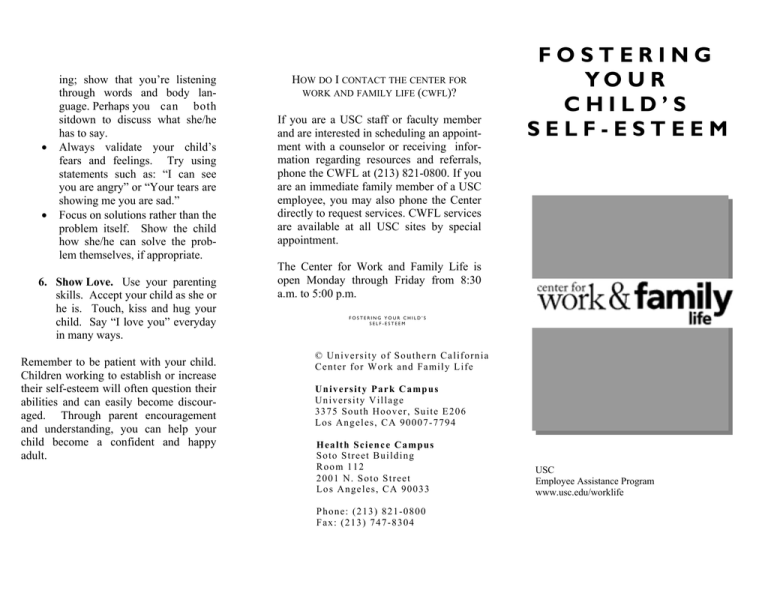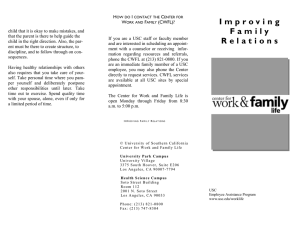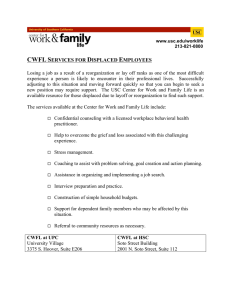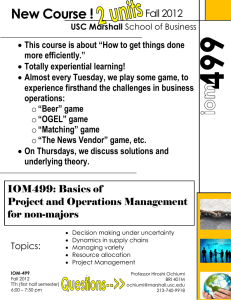F O S T E R I N G
advertisement

• • ing; show that you’re listening through words and body language. Perhaps you can both sitdown to discuss what she/he has to say. Always validate your child’s fears and feelings. Try using statements such as: “I can see you are angry” or “Your tears are showing me you are sad.” Focus on solutions rather than the problem itself. Show the child how she/he can solve the problem themselves, if appropriate. 6. Show Love. Use your parenting skills. Accept your child as she or he is. Touch, kiss and hug your child. Say “I love you” everyday in many ways. Remember to be patient with your child. Children working to establish or increase their self-esteem will often question their abilities and can easily become discouraged. Through parent encouragement and understanding, you can help your child become a confident and happy adult. HOW DO I CONTACT THE CENTER FOR WORK AND FAMILY LIFE (CWFL)? If you are a USC staff or faculty member and are interested in scheduling an appointment with a counselor or receiving information regarding resources and referrals, phone the CWFL at (213) 821-0800. If you are an immediate family member of a USC employee, you may also phone the Center directly to request services. CWFL services are available at all USC sites by special appointment. FOSTERING YO U R CHILD’S SELF-ESTEEM The Center for Work and Family Life is open Monday through Friday from 8:30 a.m. to 5:00 p.m. FOSTERING YOUR CHILD’S SELF-ESTEEM © Un iv ersity of Sou thern Californ ia Cen ter for W ork and Family Life Univ ersity Pa rk Campus Un iv ersity Village 3375 Sou th Hoov er, Su ite E206 Lo s Ang e les, CA 90007-7794 H ea lt h S c ien c e C a m pus Soto Street Building Roo m 112 2001 N. Soto Street Lo s Ang e les, CA 90033 Phon e: (213) 821 -0800 Fax : (213 ) 747-8304 USC Employee Assistance Program www.usc.edu/worklife F O S T E R I N G YO U R C H I L D ’ S S E L F - E S T E E M As a parent, we want our children to be happy and confident. To do this, parents need to treat their children in a way that makes them feel loved, capable and successful. To accomplish this certain developmental goals will need to be achieved by the child such as: an ability to trust, having a sense of autonomy, feeling a sense of competence (in both social and task completion), building individuality or identity, and achieving a level of responsibility. We can help our children in achieving these goals by incorporating positive parent-child communication techniques into the interactions we have with them. The following techniques will support your child in developing a higher self-esteem, while simultaneously building a closer relationship with them. Positive Parent-Child Communication Techniques 1. Choose Your Words Carefully. When children misbehave, parents may mistakably talk to their children in manner that does not separate the child from the negative behavior. Parents often do not think about what they are saying or implying. Below are a few examples of common questions and statements to avoid. • “What’s wrong with you?” This expression will give the child the impression or feeling that they themselves are bad. • “Why did you do that?” “Why” questions tend to promote confusion and doubt and may train a child to second-guess her/ his decisions. If you really want to know why your child is doing something, try asking: “What are you doing?” • “You shouldn’t have done that.” “Should” statements also raise confusion and doubt, and leave the child unclear about where their parents’ stand. Instead, use statements such as “I don’t want you to do that” or “Please don’t do that.” This will send a clear message to you child. 2. Develop Positive Thinking Skills. • Provide your children with positive feedback when they have completed a task or resolved an issue. Try using statements like: “You did a good job” or “I knew you could do it.” • Be a positive role model. Show your child that there is a positive way of at looking at every situation. 3. Develop Your Child’s Best Qualities. Nurture your child’s strengths and talents. Take the time to notice if your child has received a good grade or comment on her/his schoolwork. For example, if your child often helps with a project or shares her/his personal items, tell them that you are impressed with how well they work or share. Children want to hear that their parents are interested and proud of what things they have done. 4. Praise and Encourage. This should be done often and with honesty! Try using statements such as: “You did a nice job on that project” or “You can do it, I believe in you.” 5. Listen with Your Heart. You can do this through the following actions: • Listen actively. Take the time to stop and really listen to your child. It is also important to make eye contact with her/him. Give your child your full attention, which might mean putting down what you were doing to focus on your child completely. • Focus on what your child is say-






